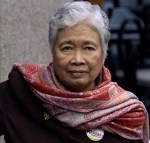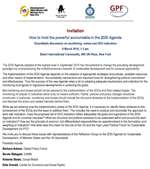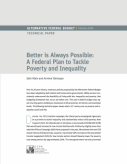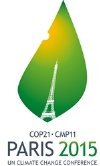Social Watch news
Published on Thu, 2016-03-03 17:52
With huge money comes huge accountability. For Leonor Briones, lead convenor of Social Watch Philippines (SWP), the billions of funds that would be poured into the soon-to-be-established Bangsamoro government should undergo thorough audit to ensure proper spending and hold specific people responsible for how the money is spent.
By the reckoning of Moro Islamic Liberation Front (MILF) chief negotiation Mohagher Iqbal, the Bangsamoro government will get an initial funding of about P70 billion in its first year of operation, from various sources, including the block grant from the government.
|
Published on Wed, 2016-03-02 10:27
Invitation to an event on March 8, 2016 in New York: The 2030 Agenda adopted at the highest level in September 2015 has the potential to change the prevailing development paradigm by re-emphasizing the multidimensional character of sustainable development and its universal applicability.
The implementation of the 2030 Agenda depends on the adoption of appropriate strategies and policies, available resources and other means of implementation. Accountability mechanisms are important tools for strengthening political commitment and effectiveness. Thus the success of the new Agenda relies a lot on adopting adequate mechanisms and indicators for the monitoring of progress or regressive developments in achieving the goals.
|
Published on Fri, 2016-02-26 12:56
The debate about regulatory versus voluntary reporting that should be required of financial institutions is very much alive. This is one of the messages coming out of the Transparency and Accountability in the Financial Sector study done by the international civil society network Fair Finance Guide International (FFG).
|
Published on Fri, 2016-02-19 10:39
During the 2015 federal election campaign, the Liberal party campaigned vigorously on a promise to tackle inequality and substantially reduce child poverty. Proposals such as the Canada Child Benefit and 10% increase to the Guaranteed Income Supplement (GIS) for low-income seniors are certainly steps in the right direction.
However, the fight to eliminate poverty and inequality is far from over. These proposals in and of themselves are inadequate to accomplishing the task. This paper, which expands upon a chapter on poverty and inequality in the upcoming 2016 Alternative Federal Budget, proposes the terms of a comprehensive federal poverty reduction plan. If the government is serious about its campaign pledge to bring real economic opportunities to more people, the practical and affordable policy tools outlined here will take them some way toward that goal.
|
Published on Thu, 2016-02-18 07:48
The Paris Agreement adopted by the 21st Conference of Parties (COP21) under the United Nations Framework Convention on Climate Change (UNFCCC) on 12 December, was the outcome of major battles on a multitude of issues, especially between developed and developing countries.
Developing countries by and large had these negotiating objectives. They wanted to (a) defend the Convention and not let it be changed or subverted; (b) ensure that the Agreement is non-mitigation centric with all issues (including adaptation, loss and damage, finance and technology, besides mitigation) addressed and in a balanced manner; (c) ensure differentiation in all aspects be reflected, with the principles of equity and common but differentiated responsibilities and respective capabilities; (d) ensure that developed countries enhance the provision of finance and technology transfer’ (f) ensure that ‘loss and damage’ is recognised as a separate pillar apart from adaptation and for (g) legally binding provisions, especially on the developed countries.
|
Published on Fri, 2016-02-12 14:10
The United Nations Environmental Program (UNEP) recently launched the report of its Financial Inquiry into the Design of a Sustainable Financial System (“the Report”), established in early 2014 to explore how to align the financial system with sustainable development, with a focus on environmental aspects.
UNEP’s Financial Inquiry set out to respond three questions: 1) under what circumstances should measures be taken to ensure that the financial system takes fuller account of sustainable development?, 2) what measures have been and might be more widely deployed to better align the financial system with sustainable development? and 3) how can such measures best be deployed?
|
Published on Fri, 2016-02-12 14:05
Given that most of their population lives in rural areas, the rural economies in the Least Developed Countries (LDCs) will need to undergo structural transformation in order to reach the United Nation's Sustainable Development Goals (SDGs), the UN Conference on Trade and Development (UNCTAD) has said.
In its latest Policy Brief (No. 46 of February 2016), UNCTAD has proposed that the LDCs engage in poverty- oriented structural transformation of rural areas, encompassing the upgrading of agriculture, the diversification of rural economic activities and the strengthening of synergies between both.
|
Published on Thu, 2016-02-04 16:09
The Swiss Parliament is discussing corporate tax reform III. In development policy terms, with this reform Switzerland is going from the frying pan into the fire.
For every US dollar a developing country gains, it loses more than two. A wide range of capital transfers help account for the constant drain of financial resources away from developing countries. According to calculations by Eurodad, the European Network on Debt and Development, developing countries lost US$1,583 billion in this way in 2012. That is more than 10 times the US$120 billion that flowed into developing countries in 2012 in the form of official and private development assistance.
|
Published on Mon, 2016-02-01 11:46
The Least Developed Countries (LDCs) are truly the battleground on which the United Nation's Sustainable Development Goals (SDGs) will be won or lost, and the rural areas in the LDCs are the front-line of the battle, the Secretary-General of the United Nations Conference on Trade and Development (UNCTAD) has said.
In his statement at the sixty-second executive session of UNCTAD's Trade and Development Board (TDB) on Monday, the UNCTAD head, Dr Mukhisa Kituyi, said that this first executive session of 2016 comes at a paradoxical moment for the international community.
|
Published on Tue, 2016-01-19 12:45
Owners, executives and managers of some prominent companies actively participated in the human rights violations committed against workers during Argentina’s 1976-1983 dictatorship, according to the report “Business responsibility in crimes against humanity: The repression of workers during state terrorism.” (available in Spanish) The report, laying out evidence of such violations, was recently released by Argentine human rights organization the Center for Legal and Social Studies (CELS, according to its acronym in Spanish), the Area of Economy and Technology of the Latin American Faculty of Social Sciences (FLACSO-Argentina), and the Truth and Justice Program and Human Rights Secretariat – both of which belong to the Argentine Ministry of Justice and Human Rights.
|
SUSCRIBE TO OUR NEWSLETTER
Submit

|










